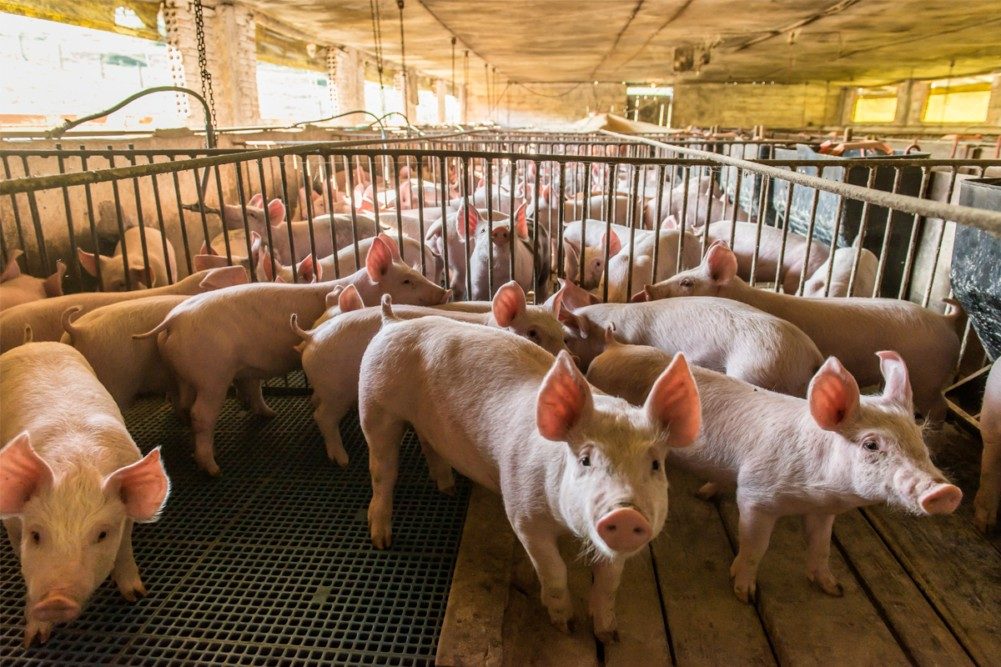KANSAS CITY, MO. – On June 12, the North American Meat institute (NAMI) and the California Dept. of Food and Agriculture (CDFA) held a webinar to provide guidance on California’s ballot initiative Proposition 12, that regulates confining farm animals, specifically laying hens, breeding sows and veal calves. The webinar focused on breeding pigs and veal calves, and the products derived from them. Prop 12 also prohibits sale of products in the state of California that do not meet California’s standards of confinement according to Prop 12.
Elizabeth Cox, DVM, leader of the Animal Care Program at CDFA and Annette Jones, DVM, and Director of Animal Health and Food Safety Services at CDFA, detailed the regulatory framework, products and transactions covered under Prop 12 (veal and pork), producer and distributor responsibilities and compliance, distributor registration and certification and exceptions.
A compliant breeding pig and her immediate offspring must be in a compliant enclosure for the duration of its production cycle. Compliant enclosures “…shall allow the breeding pig to lie down, stand up, fully extend limbs, and turn around freely,” and “…shall provide a minimum of 24 square feet of usable floorspace per breeding pig.”
Cox defined production cycle within the regulation as, “the lifecycle of a commercial breeding pig for the generation of immediate offspring, the production cycle for gilts begins when they are six months or older and moved into an enclosure for breeding and ends when a litter of piglets is weened.”
Therefore, pigs can be moved in and out of compliance relative to their production cycles.
Pork and veal products covered under Prop 12 include whole cuts of raw pork and veal and excludes ground or comminuted products, combination products such as pizza, soups and sandwiches, etc., and ready-to-eat products.
Regarding the commercial sale of pork and veal in California, CDFA’s regulatory focus is on distributors. Cox defined commercial distributors as those selling to an end user, i.e., selling whole, raw cuts of pork and veal to consumer retail locations, selling to end users who will use the raw meat as an ingredient and restaurants. Exceptions to commercial sale regulations include noncompliant meat moving through the state without being further processed, “transshipment” such as meat for export or moving through California to another state. Federal lands, such as a military base, and tribal lands also do not need to be compliant. The shipping documents for these products must be marked “For export,” “Transshipment,” or “Not Prop 12 compliant.”
Registration for distributors seeking compliance started on Jan. 21, 2023, with applications still being accepted. Registration is required for each location with no fee and expires 12 months from the date of issue. Distributor certification will not be necessary until Jan. 1, 2024. After Jan.1, 2024, each location will need third-party certification yearly (begins and ends on original date of issue) and will require an on-site inspection for each distributor location.
Distributors may choose from a list of auditors for certification. Requirements for certification include an audit trail, and shipping document marking proving the product is compliant. Compliant products will require a spec statement on shipping documents with type of product and statement of compliance, for example, “Pork, CA Prop 12 compliant.” No spec statement is necessary on actual product for sale or labeling.
Distributors with a “split operation,” meaning some products do not require compliance and some do, must follow all the regulations for the compliant necessary part of operations.
For detailed descriptions of all regulations, compliance guides and certification requirements and dates, visit https://www.cdfa.ca.gov/AHFSS/AnimalCare/.


